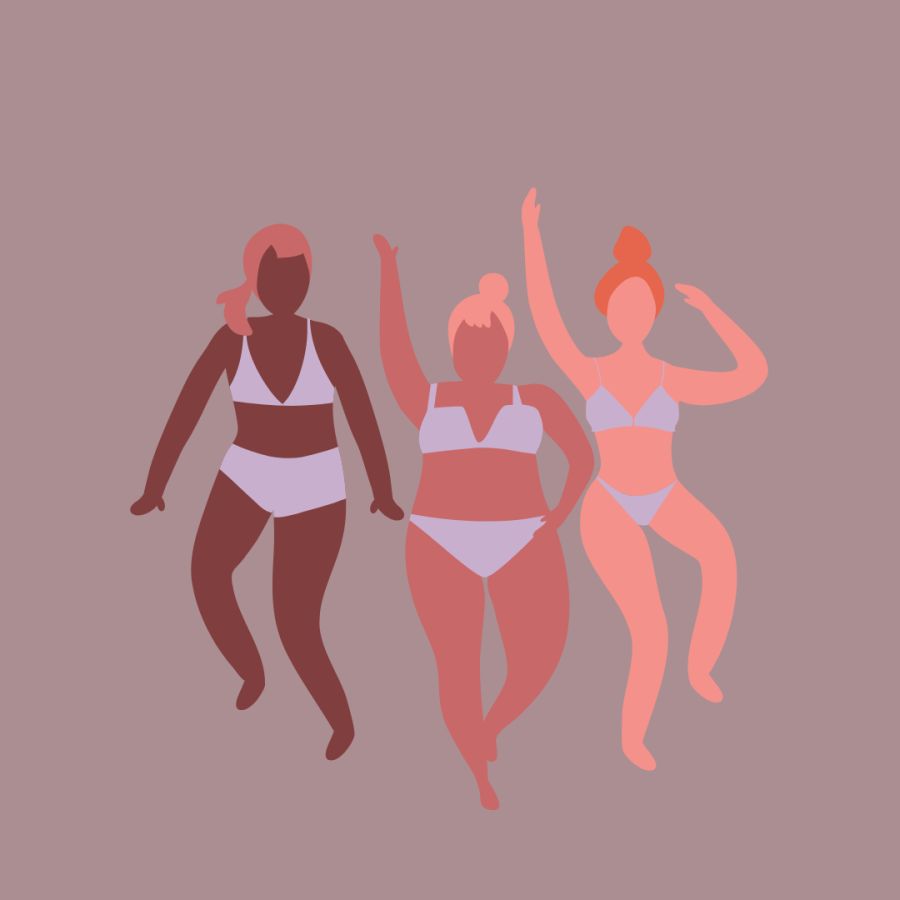Breaking Down the Bikini Body Narrative
With summer beginning, it is important to be wary of the “bikini body ideal”.
Many people encourage celebration of all body types to fight back against the “bikini body” narrative.
As the weather warms, fashion begins to change. Jeans, leggings, and sweatshirts are replaced by tank tops, shorts, and swimsuits. Each year, this change comes with a shift in marketing from brands as they begin to promote their summer clothing lines. Often, brands and consumers will dub this time of year as “bikini season”, encouraging the idea that a “bikini body” is required to enjoy summer.
The term “bikini body” can be traced back to 1961 when Slenderella International promoted weight loss, declaring a “High firm bust — hand span waist — trim, firm hips — slender graceful legs — a Bikini body!” as the ideal. Since then, the term has gone in and out of style, getting rebranded several times.
“Typically [when I think of the term ‘bikini body’”], I think of girls who are a size 0 and have the ‘perfect’ body,” said Lilly Harris, 11.
The “bikini body” encourages the idea that, especially girls and women, need to have this “perfect body” to deserve feeling comfortable and confident in summer clothing. However, these are hardly realistic standards. Thus, diets and restrictive eating as well as disordered eating are often encouraged to achieve the ideals. This is often incredibly damaging and can have very negative effects on overall health and mental wellbeing. Each year, disordered eating directly results in 10,200 deaths or one death every 52 minutes according to the ANDA.
“If someone is constantly comparing themselves to a standard set by society, then they will never truly be happy until they get that social approval. This can be really damaging to someone’s self image and mental health, which are very important to a person’s well being,” said Jolie Nordell, 11.
The introduction of social media altered the consumption of “bikini body” ideas.
“We’ve seen the standard become more and more unrealistic with the introduction of social media… Women would be expected to wear certain clothes, look a certain way, and even act a certain way. If they didn’t fit in specific lines set by society, they were ostracized or outcast,” said Nordell.
A Vogue article titled, “When Will We Stop Reducing Women’s Body Types to Trends?” discusses the recent shifts in the “ideal” female body. Not only are these standards unrealistic but they are ever changing. Routinely changing the ideal makes it even less likely consumers will be able to achieve it.
Social media platforms such as Tiktok, Youtube, and Instagram allow consumers to share their opinions with anyone. This often leads to the proliferation of the “bikini body” without mainstream brands involved.
Though these unrealistic standards are harmful to both men and women, these ideals are often more heavily targeted at women.
“I think as a male teenager it’s definitely harder for us to become victim to this ‘bikini body’ because I think this standard was intended to be used for females who wanted to appeal to males. At its core this standard seems to me like something that people put so much more pressure on young girls than boys. I think that when it comes to whose self-image [is] being harmed more I immediately think of the young girls…,” said Cooper Davenport, 11.
However, this does not mean that boys and men are not affected by the unrealistic standards set.
“That sort of narrative makes me almost want to skip out on doing things outdoors in swimsuits because of the way people look at me when the way I look doesn’t match their image in their head of what a body should look like,” reflected Davenport.
Unrealistic body ideals have a negative impact on everyone. However, many students at Liberty are working to encourage moving away from the “bikini body” ideal.
“It’s important to love who are you are and be comfortable with yourself… We aren’t all supposed to look like each other, that’s why everyone is unique, even genetically speaking,” encouraged Nordell.
Davenport also shared advice for those trying to combat these ideas.
“It’s important to remember that you only get one chance at this life and if you spend your whole time on this planet trying to fit into everyone else’s boxes you will never fully experience what it means to be you… I hope that everyone who struggles with their self-image finds love and beauty within themselves because life is so much more colorful when you can see the beauty in everything, including yourself,” said Davenport.

Leela is a senior at Liberty High School. This is her second year on the Live Wire staff. At Liberty, Leela plays tennis and is part of SEA club. Outside...













